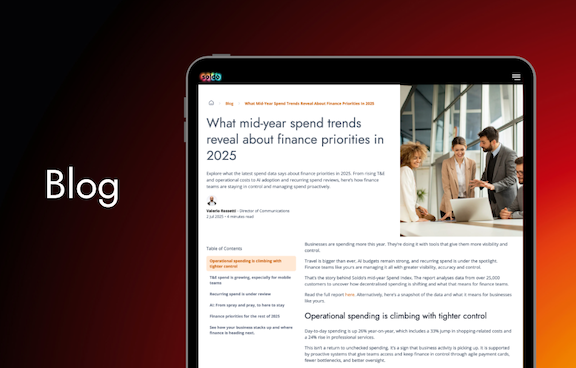Keeping your team motivated through the ups and downs of business is one of the greatest leadership challenges. It takes time, strategy, and emotional investment to help guide your team toward long-lasting success.
Joel Stephens, VP2 Finance and FP&A at fashion shopping app and website Lyst, learnt what it takes through his own experiences of leading three different teams and the examples set by his supervisors.
He joined us on The CFO Playbook and shared his tips for building a well-run, highly motivated finance team.
1. Become a mentor
For employees to work well with you and their team, you need to create a nurturing environment where they can flourish. This requires you to put on your ‘mentor’ hat.
When Joel first started at Lyst, he was surprised when his manager asked how he was doing on a personal level during his weekly check-in. He realised these meetings went beyond the typical status update, and his manager actually cared about his well-being.
This opened up Joel’s eyes to the importance of caring for his own team:
‘That’s how I needed to be with the people who were working with me – to build that sort of nurturing environment, and to find people’s strengths and to encourage those, and to find people’s weaknesses and help them develop those’.
Becoming a mentor means dedicating the time to get to know each employee on a personal level so you can understand their internal motivators and use those to create a workspace they thrive in.
2. Promote autonomy
Teams will work smarter and faster when they have the ability to make their own decisions. Autonomy breeds responsibility, meaning if your team can call their own shots, they will be more dedicated to the outcome of their work.
Joel sees higher rates of engagement and motivation when he places full trust on his team to independently take on projects:
‘They can run the team the way that they want to run it, they can pick the projects that they work on, and it gets them quite engaged’.
An autonomous team will accomplish more than those being micromanaged. All you need to do is set the standard and trust your team to get the job done.
3. Recognise and reward your core finance team
Many view core finance as the ‘unsexy’ side of the business. However, the value other teams bring to the table is only as solid as the foundation the core team sets. In other words, trending conversion rates mean nothing if payroll keeps failing.
According to Joel, the core finance team is like the base of a cheerleading pyramid, with the FP&A team standing on their shoulders:
‘You’re impressed by the person doing the handstanding, but there’s no way that would work unless you had a really strong base underneath it. And that’s kind of the same with these two teams’.
Your core finance team provides the grounding and stability necessary to keep your company functioning day-to-day, and without them, it would be challenging for other teams to gain real traction.
While your core team might feel underappreciated due to their reputation as a ‘business-as-usual’ function, it’s crucial for you, as their leader, to give them the recognition and support they need to stay motivated in their roles.
4. Implement the MVP framework
If you want to get the most out of your finance team, you have to work smarter, not harder.
For Joel, this means using the minimum viable product (MVP) framework, a concept from The Lean Startup. The idea of an MVP framework is to create a basic, unfinished model which you can send out to get initial feedback from a stakeholder or business partner.
Rather than investing time into something of little value, you ask for feedback early on in the process to help you stay on track:
‘If they say they like it, you do a little bit more, and then you get some more feedback. And the idea is you don’t go too far down the rabbit hole before you realise you’ve done something wrong’.
Time well spent is a huge motivator for teams. The less time they waste, the more productive they will feel.
Reap the rewards of investing in your team
If you want to set your team up for long-term success, you have to put the time and effort into helping them learn the ropes. Offer mentorship, give them autonomy, recognise hard work, and prioritise their time.
When you invest in your team, they invest their talents back into your company.
Listen to the full episode
Hear the full conversation with Joel Stephens, and get the latest insights to help you grow your career, and your company.






























